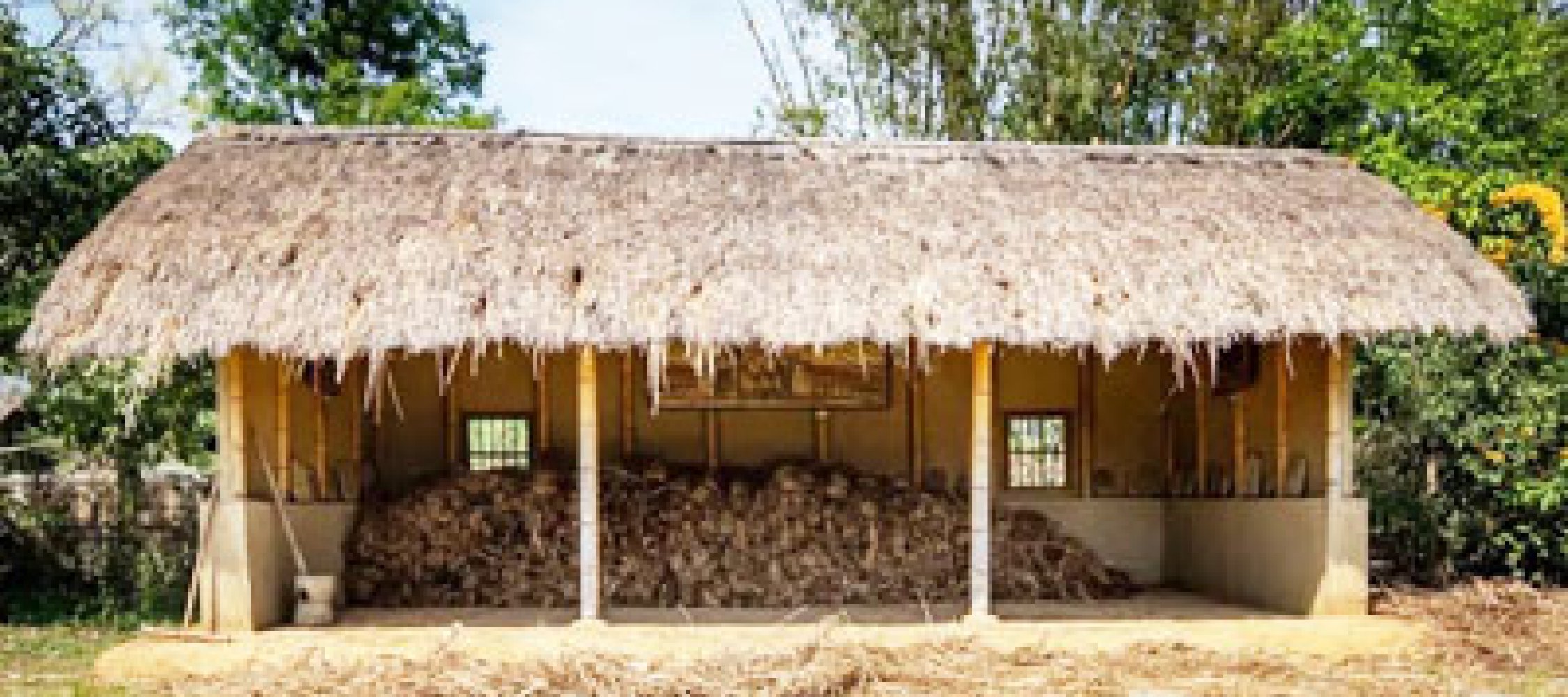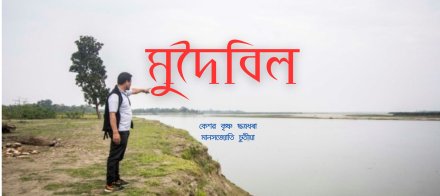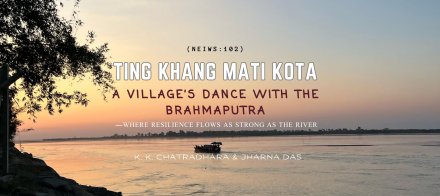 |
Cosmology
In Leishemjagoi, the dance of creation and procreation, during Lai Haraoba, it exalts the nine gods and seven Pleiades in the enactment of the creation of this earth and all beings on it. According to traditional Meitei religious Thawai Meeren philosophy, all life forms originated from water. Water was the first element that was there when the god Ashiba created this world. All life forms started from it.1 The central role played by water, and its harnessing through an ingenious system of canals, dykes and reservoirs, in the emergence of the Meitei nation, was a feat none less than a coup d’etat. Managing water in the Imphal valley was more than just an engineering tour de force. The wetlands and waterways that were created became channels of exchange and communication between clans and tribes, as well as between human and spirit worlds. The Imphal valley is therefore not merely a natural feature of immense environmental importance but one of the greatest artefacts of the Meitei nation. Water is not only an everyday preoccupation of the Meitei. It is a central element of the Sanamahi Pakhangba, the ancestral belief system that the Meiteis have been practising for millennia. The settlement of this valley involved sophisticated hydraulic engineering, informed by a deep understanding of the hydro-dynamics of the valley, which was extremely hostile to human habitation and cultivated food production.2
What remains of this knowledge now is to be seen as the claws of development digs deep into our lands, forests and water sources.
Andro – an inner sanctum of the Meiteis
Close to the foothills of the Nongmaiching (Baruni) hills, about 27 km from Imphal, the capital city of Manipur along the Imphal-Ngariyan hill road, lies one of the state’s oldest villages, Andro, where a sacred fire has been kept burning for the past 2,000 years. The inhabitants of this village are known as Loi, a Scheduled Caste community listed under the Scheduled Castes and Scheduled Tribes orders (Amendments) Act, 1956 (Act no. 6 of 1956) in Manipur.
The word, Andro, is derived from the word ‘Handro’ meaning, “return after a long separation”. The people of Andro belong to the ‘Chakpas’. They still maintain their caste solidarities with an indigenous state of economic life. Traditional agriculture as a primary means of livelihood is followed by pottery, piggery, wine brewing, weaving, and basketry. Andro village is divided into 13 leikais (localities). The people of Andro take immense pride in their origin, tradition, culture and history, and still maintain their realistic ideology. The Andro nagar panchayat has a population of 8,744 of which 4,307 are males while 4,437 are females as per Census 2011. The female sex ratio is 1,030 against the state average of 985, and women are the backbone of the society taking care of all economic activities, from brewing wine to pottery to piggery to weaving to agriculture; They even play football.
Meeting Realities
Andro is famous for its hand-made pottery (without the use of wheel), yu (rice brew), cultural complex cum museum, the Chakpa Panam Ningthou Meithoupirol Shanglen, and the Santhei Natural Park amongst many others. The vast paddy fields surrounding the village provide both work and food. To cultivate the vast fields, to brew the various kinds of local yu, the pottery and to exist requires a lot of water. Due to the rise in population and the increase in the export of yu, water scarcity problems arose. It was during the late 1970s, with the consultation of villagers, the Citizens Volunteer Training Centre (CVTC), a pioneer NGO, took on a mammoth task to solve the water issue in the village. Three ponds – one at the Santhei Natural Park, the other in the premises of Panam Ningthou Graden, and the third, Leng Pukhri – were dug to meet the current demand of water. These were eventually handed over to the village.
Chakpa Panam Ningthou Meithoupirol Shanglen is a place of immense importance to the Andro people because the village hosts the sacred fire, which has been burning for ages. To keep the fire burning requires firewood, this comes from the hills surrounding the village. Lambuba demarcates and administers the village along with cutting the firewood for the sacred place. Trees that are five years old or older are marked, reserved and cut down for the firewood. No trees from outside the marked premises can be cut down. To understand the water and culture of Andro, one needs to understand the surrounding hills, the system of annual cutting of trees and new plantations.
Present situation of water
About 25 per cent of the households use tap water, 27.5 per cent use hand pumps, and 49 per cent use spring water in Andro as potable water. Pipes have been installed but potable water is still a far cry for the inhabitants. The main source of water all through the year is the Santhei community pukhri (pond).
With the increase in population, demand for yu has also shot up over the years. But according to the village rules, no one can use the Santhei water for brewing. The Leng Pukhri is managed by the Ngayok Committee (Nga- fish, Yok- farming) which is used for fishery. The committee allows fishing at the Leng Pukhri every five years. The catch is distributed among the committee members and the villagers buy fish from them. Water dependency in times of need is met by the reservoir at Santhei Natural Park. During the dry season all villagers come to the reservoir to fetch water regardless of their gender. Fetching water is free, but now due to lack of time, drudgery, and other reasons people have started buying water from the middle men. This means that when a family doesn’t have the time or menpower to fetch water from the reservoir, they ask a private party to fetch water for the family and pay in return. The amount paid or obtained by the party is hard earned money for his/ her labour. A small sum of money is given to the committee that manages the natural park as a commission for maintenance of the park. The existing rate, in case one wants to get water through a private party, is Rs.200 per 1,000 litres. This water from the park is used for cooking and drinking purposes, while water for domestic usages comes from the small ponds and streams in and around. Families dwelling in the proximity to the surrounding hillocks have their own wells. During the rainy season, families residing in Awang Leikai get piped water from the tank built at the Nongmaiching hills, but they too access the water from the community pond if it dries up in their tank.
Role of women
Women play a major role in the management of water for domestic usages. Men are engaged in management of water for farming and on a large scale, because it is the Lambuba’s duty to conserve the water supply along with meeting the demand for firewood. Demand for firewood is for different purposes like for upholding the age-old tradition of Chakpa Panam Ningthou Meithoupirol Shanglen; for brewing yu; for domestic purposes, and for funerals.
Water and Yu
Selling yu or the local brew is almost similar to selling water from Andro because to brew a litre of yu requires a large amount of water – approximately 10 litres. Water is an important factor in the production of yu. The taste of the yu isn’t entirely from the way it is processed but also from the taste of the water and where it is sourced from. Usually, the water used for brewing mostly comes from the small ponds. To brew a yu-phu requires around 5-6 traditional korphu (local water container) of water. The required amount of water to brew is less in the winter as compared to the summer. It won’t be wrong to say that a half of the water requirement in the village is entirely for brewing purposes. However, these water estimates for preparing yu will need further research.
The traditional system of local beverage preparation was generally practised by the women of Chakpa community. Brewing rice wine is a historical phenomenon as it was essential on certain festivities of rites of passage. Moreover, it is also used for treatment of muscular pains, cough and cold, and stomach ailments. A significant number of families depend on the production of yu for their livelihood and income, so much so that there was a minister for monitoring the production of yu.
Phamdou is a traditional institution of Andro village. It is the oldest traditional institution, which has been in existence even before the system of recording history began. The first recorded history began when Nongda Lairen Pakhanba became the king of Manipur in the year 33 AD. Khullakpa was the head of the Loishang and the traditional government. He was also the head of the Loishang (village court). He headed all the three organs of traditional governance institutions – legislative, executive and judiciary. He chaired all the meetings of the traditional assembly. He appointed all the other consensus members of the Phamneiba Lupllakpa, Khunjamba, Yupalba, Khabamlakpa, Pakhanglakpa and Naharakpa. He also appointed Maichou (priest) and Maibi (priestess) after the approval in the general body meeting of the village. Interestingly, Yupalba is the minister of yu, waiyu (special wine for community festivals and rituals) and atingba (rice beer). His main duty is to test the quality of yu, waiyu and atingba. He is also responsible for providing food for guests and community festivals and rituals.
Such was the importance of brewing wine in Andro, and the need to allocate water for this purpose. Manipur is a dry state but traditional brewing of alcohol is not prohibited although the sale of yu outside Andro may come under the radar of the police forces. While there is no official data, the people living in Andro are of the view that brewing wine is imperative for their survival as a livelihood option. In fact, water used for brewing wine far exceeds the daily essential consumption of water.
On Current Santhei Natural Park and the present conflict
There has been a drastic change in the management of natural resources, particularly in the valley and the foothills. Despite all these traditional institutions of the Chakpa and Sekmai, the Lois are still controlling the natural resources of forests, agricultural lands and rivers. The Andro villagers have been controlling and managing a large forest area of about 46,000 acres. The reserved forest is better protected by the traditional institutions than any of the government controlled reserved forests. About 30 per cent of villagers depend for their livelihood on the community’s unreserved forests. Holistically, the traditional institutions of the village level Lambuba and the intra-village Lambuba have been functioning more successfully than the government institutions, local people claim.
The Santhei Natural Park is a scenic park, which came to limelight after a music video from a movie, ‘Langmeithanbi’, was shot there. People started looking for the place and when they located it, they became aware of its beauty, tranquil atmosphere amidst greenery and the water reservoir. A group of people cleaned up the place and turned it into a natural park. As the news of this park spread, visitors from all over the state began to flock in. The water reservoir inside the premises is the main attraction of the park. Due to the demand and for aesthetics, thatch and bamboo huts were built. The management of the park was handed over to the eight Shinglups, a local governing institution, of the villages. Each Shinglup appoints three of its members to the committee that looks after the park; so a total of 24 Lambubas manage the park. The income generated from the park is audited by another two villagers appointed by the Shinglup. The income is kept for the maintenance of the park.
But in September 2020, the Department of Tourism of Manipur decided to run the park in partnership with a private party. It floated a tender for “Operation and Maintenance of Tourist Destination at the Santhei Natural Park, Andro, Manipur” through the public-private partnership (PPP) mode, which irked the local community and triggered conflict between the villagers and the state government. The villagers questioned the government’s intention, asking why a park maintained by the community should be leased out to a private party. The community feared that once the PPP mode became functional, their access to this vital source of water would be restricted. Earlier, when the government acquired lands for the Krishi Vigyan Kendra, the villagers were denied access to the area from where they used to get their raw materials for making pottery, which badly affected their livelihood. And now if their main water source was taken away how would the village of 500 families survive?
They accused the government of promoting vested interests, denying the community of its rights over the Santhei Park. Once the park was handed over to a private party, they feared, not only would they have no access to water for their survival, but they would also lose all their means of livelihood. During the COVID-19 pandemic, irate locals of Andro erupted into protests, and held various consultations and meetings with various stakeholders. A long struggle – to resist the government move and get back the park – is ahead of Andro now.
References:
1https://www.academia.edu/41558956/RELIGIOUS_CEREMONIES_AND_ FESTIVALS_AMONG_THE_METEIS_OF_MANIPUR.
2UNESCO, 2006, Water and Indigenous Peoples. Edited by R. Boelens, M.Chiba and D.Nakashima. Knowledges of Nature 2, UNESCO: Paris,177 pp.UNESCO, 2006, Water and Indigenous Peoples. Edited by R. Boelens, M. Chiba and D. Nakashima. Knowledges of Nature 2, UNESCO: Paris, 177 pp.
- https://www.census2011.co.in/data/town/801495-andro-manipur.html
- https://www.hindawi.com/journals/janthro/2014/321480/Women’s Perception of Reproductive Illness in Manipur, India, PebamKrishnakumari, 1 P. C. Joshi, 2 M. C. Arun Kumar,1 and M. Meghachandra Singh 3
- https://shodhganga.inflibnet.ac.in/bitstream/10603/93313/9/09_chapter. 204.pdf
- https://en.wikipedia.org/wiki/Andro,_Imphal_East
- ROLE OF TRADITIONAL INSTITUTIONS IN PROTECTION OF NATURAL RESOURCES AMONG THE SCHEDULED CASTE LOI VILLAGES IN MANIPUR:A STUDY OF ANDRO VILLAGE RAKESH S. KHWAIRAKPAM Phd Scholar, School Of Social Sciences Tata Institute of Social Sciences (TISS)
- Environment Chronicles: the best of TerraGreen by TERI, The Energy and Resource Institute, 2011
- https://www.academia.edu/41558956/RELIGIOUS_CEREMONIES_AND_ FESTIVALS_AMONG_THE_METEIS_OF_MANIPUR
- https://ifp.co.in/andro-locals-protest-against-government-plan-to-run-santhei-park-in-ppp-model
- http://www.manipurtourism.gov.in/wp-content/uploads/2020/09/Operation-and-Maintenance-of-Tourist-Destination-at-Santhei-Natural-Park-Andro-Manipur.pdf
About the writer:
Ramananda Wangkheirakpam is the convenor of Ngamee Lup, a federation of small scale fishing unions in Manipur. He is associated with the environmental issues in the region for a long period. (wangkheilakpa@gmail.com, +917085593415)


